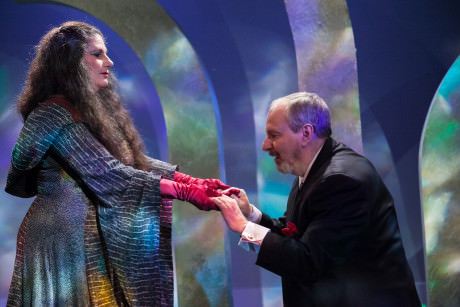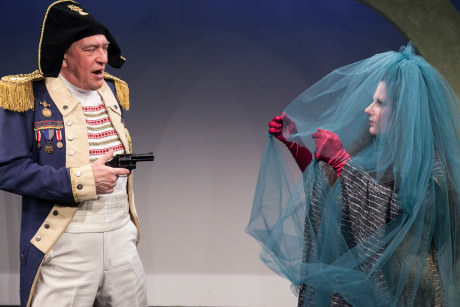George Bernard Shaw wrote Back to Methuselah (A Metabiological Pentateuch) during World War I, with its assassination, its trench warfare, its chemical attacks, its all-too-human brutality unleashed — and, of course, its Sun Never Sets British Empire.

Like many Europeans, Shaw experienced the catastrophe with a profound sense of tragedy: the West and its supremacist thinking, the ideology that was to bring enlightenment ideals to the “barbaric” world, could not prevent even the slaughter of its own people, by the millions.
Back to Methuselah was his response to the horror.
Written in three parts (five plays) the cycle is rarely done; following its New York premiere at the Garrick Theatre in 1922 and its British premiere at the Birmingham Repertory Theatre in 1923, it has been staged rarely, most recently in a dramatically scaled down version in 2000 by the Royal Shakespeare Company. In fact, Shaw himself considered the piece philosophy more than theatre, thinking of it read not witnessed.
Washington Stage Guild is currently producing Part 2 — “The Thing Happens” and “The Tragedy of an Elderly Gentleman” (Part 1 happened last year and Part 3 next year). A monumental challenge to be sure, given the play’s philosophic text and Shaw’s penchant for long-windedness, the Guild’s production of “The Tragedy” resonates thoroughly with the audience; its take on “The Thing Happens” — well, let’s just say “I think you had to be there,” meaning where the play is set: the official parlor of the President of the British Islands.
Did I mention that Back to Methuselah Part 2 is also science fiction? The plays take place in 2170 A.D. and in 3000 A.D., respectively, in a time when some human beings have developed the capacity to increase their life span, and with that their wisdom, to 300 years.
The world of “The Thing Happens” remains disjointed, failing to allow for the suspension of disbelief. We can hear the six characters speak but we have difficulty treating them as any more than caricatures without context.
President Burge-Lubin, played with great guffaw by Conrad Feininger, prefers golf to serious work. In fact, he has hired a “foreigner”, Confucius, to run his affairs. Confucius is played with a calming wisdom by Jacob Yen. Not surprisingly, these plays have a great deal to say about politics, even 100 years and an ocean removed from their place of origin.
Virtual reality exists, as the President beams the Minister of Health (played with determined charm by Laura Giannarelli) into the room.
The action gets stirred a bit when it is discovered that the Archbishop of York, played by the unroughable Brit Herring, has lied about his age. He has exceeded the government approved age of 78 and is now well over 250 years old.
The Accountant General, Barnabas, is concerned: all those benefits — who will pay for those? Michael Avolio captures the farcical outrage.
When Mrs. Lutestring, the Domestic Minister (an unflappable Lynn Steinmetz) is ushered in to bring clarity to the situation, it turns out that she too is approaching the magic age of 300.
Shaw clearly cared more about the politics and the philosophy of the situation than he did the theatre. Other than Barnabas huffing and puffing occasionally, there is little dramatic tension in the piece, even when the Methuselahs waltz off stage as progenitors.
Happily, “The Tragedy of an Elderly Gentleman” fares far better in that department.
Vincent Clark plays the elderly gentleman who has come to the holy Oracle near Galway Bay, Ireland. A native of the English capital, now located in Baghdad — yes, given the current situation in the Middle East the irony of this play is palpable — Clark’s gentleman is filled with angst.
As a short-liver, meaning someone like us who dies at around 80 (give or take), he travels the world trying to enjoy life. Unfortunately, his anguish prevents him. We never come to know why he despairs (one can only assume old age fills him with fear).
The people of Galway Bay assume that he is “discouraged”, a common side-effect for short-livers who come into contact with those who live to 300 years.
So the islanders bring in one of their youths, a 56-year-old Zoo, played with youthful enthusiasm by Stephanie Schmalzle. At first she succeeds, using all of her college-girl-like charm to placate the grumpy Englishman.
When he continues to throw his nastiness at her, she changes her political affiliations just like a youngster. She will no longer be a “conservative”; she will now be a “colonist”.
The Englishman inquires as to the meaning of those terms. The conservatives think the islanders should remain on the island. The colonists want to take over the world and exterminate all the arrogantly foolish short-livers.
Alarm bells ring and the play’s dramatic action takes hold.
Napoleon makes an appearance, played with zest by Conrad Feininger; but when the Envoy enters, played with a politician’s phony by Brit Herring, the Americanization of this British Empire resounds.
Bill Largess directed the two shows, but never fully solved the challenges presented by “The Thing Happens.”
Set Designer Shirong Gu has done a marvelous job creating a single set for the two plays that is both spiritually provocative and functional. Lighting by Marianne Meadows is particularly spectacular during the oracle scenes. Costumes by Debbie Kennedy probably could have added more to the science fictional overtones of this production’s futuristic worlds.
Shaw considered Back to Methuselah a masterpiece and, to his credit, the piece does not shy away from profundity. Many of its insights still cast critical shadows on Western Exceptionalism, and the despair that runs like an underground stream beneath every moment of these plays is still viscerally felt.
And, for that alone, this production, even with its weaknesses, is worth seeing.
Shaw’s “Metabiological Pentateuch” (pentateuch is a word for the first five books of the Old Testament) will spin your head a few times and leave you laughing ironically more than once.

Running Time: Two hours and 30 minutes, with one intermission.
Back to Methuselah plays through March 15, 2015 at Washington Stage Guild performing at the Undercroft Theatre of Mount Vernon United Methodist Church – 900 Massachusetts Avenue, NW, in Washington, DC. For more information and for tickets, call (240) 582-0050, or purchase them online.
RATING:




